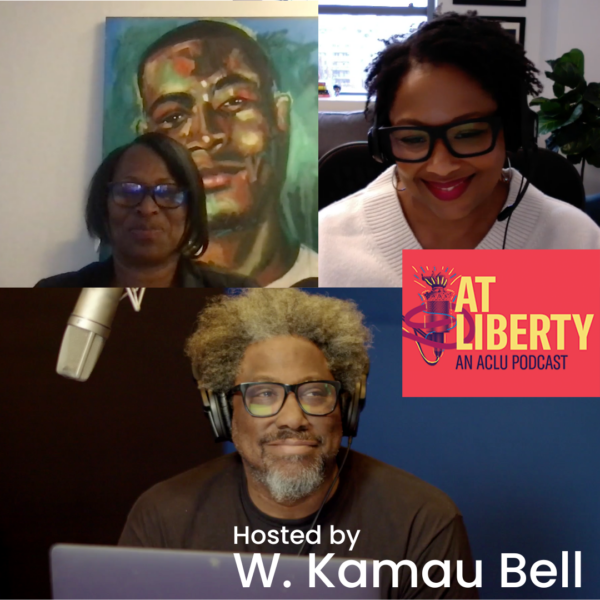
As the gang conspiracy trial of rapper Young Thug and his famed rap collective, YSL, extends past 20 days in Atlanta, we’re bringing you a conversation about the use of rap lyrics in court.
Despite a groundswell of activism and legal opposition against the legal admissibility of Young Thug’s lyrics, a judge ruled in November that lyrics from Young Thug and other YSL artists can be used by the state against them as evidence pointing to the gang’s existence and the members’ attitudes towards the crimes they are charged with.
We’re revisiting an episode from our archive about how the use of an artist’s creative work in court allows for implicit bias to run roughshod on rappers’ lives and lead to wrongful convictions. Joining us to discuss the evolution of this practice is Erik Nielsen, professor at the University of Richmond and co-author of the book “Rap on Trial: Race, Lyrics, and Guilt in America.” We are also joined by New Orleans rapper, songwriter, and former member of the 504boyz, Mac Phipps who experienced firsthand how the use of lyrics on trial can lead to a wrongful conviction.
In this episode
Kendall Ciesemier

Listen to this episode on
Apple Podcasts SpotifyThis Episode Covers the Following Issues
Related Content
- Press ReleaseApr 2025

Racial Justice
Federal Court Grants Preliminary Injunction Against Department Of Education’s Unlawful Directive. Explore Press Release.Federal Court Grants Preliminary Injunction Against Department of Education’s Unlawful Directive
CONCORD, N.H. – In a victory for students, parents, and educators, a federal judge has granted a request for a preliminary injunction blocking enforcement of the U.S. Department of Education’s (ED) February 14, 2025, “Dear Colleague” letter against the plaintiffs, their members, and any entity that employs, contracts with, or works with one or more of Plaintiffs or Plaintiffs’ member. The court’s ruling blocks ED’s unprecedented and unlawful attempt to restrict discussions and programs on diversity, equity, and inclusion in educational institutions, and its threat to withhold federal funding for engaging in such efforts. The Dear Colleague Letter’s directive contradicts long-standing legal protections for academic freedom and violates the constitutional rights of students and educators by imposing vague and coercive restrictions on curriculums and programs. The preliminary injunction prevents ED from enforcing the directive while litigation continues, ensuring that schools can continue their educational mission without fear of federal retaliation. “Across the country educators do everything in their power to support every student, ensuring each feels safe, seen, and is prepared for the future. Today’s ruling allows educators and schools to continue to be guided by what’s best for students, not by the threat of illegal restrictions and punishment. The fact is that Donald Trump, Elon Musk, and Linda McMahon are using politically motivated attacks and harmful and vague directives to stifle speech and erase critical lessons to attack public education, as they work to dismantle public schools. This is why educators, parents, and community leaders are organizing, mobilizing, and using every tool available to protect our students and their futures,” said National Education Association President Becky Pringle. “While this interim agreement does not confirm the Department's motives, we believe it should mark the beginning of a permanent withdrawal from the assault on teaching and learning. The Department’s attempt to punish schools for acknowledging diversity, equity and inclusion is not only unconstitutional, but it’s also extremely dangerous -- and functions as a direct misalignment with what we know to be just and future forward. Today’s decision is a critical step toward protecting the freedom to teach, and the freedom to learn,” said Sharif El-Mekki, Center for Black Educator Development CEO & founder. “Today’s ruling is a victory for students, educators, and the fundamental principles of academic freedom. Every student deserves an education that reflects the full diversity of our society, free from political interference,” said Sarah Hinger, deputy director of the ACLU Racial Justice Program. “The federal government has no authority to dictate what schools can and cannot teach to serve its own agenda, and this ruling is an important step in reaffirming that.” Gilles Bissonnette, legal director of the ACLU of New Hampshire, said, “The court's ruling today is a victory for academic freedom, the free speech rights of educators, and for New Hampshire students who have a right to an inclusive education free from censorship. Every student, both in the Granite State and across the country, deserves to feel seen, heard, and connected in school - and that can't happen when classroom censorship laws and policies are allowed to stand." On March 5, the American Civil Liberties Union, the ACLU of New Hampshire, the ACLU of Massachusetts, the National Education Association (NEA), and the National Education Association–New Hampshire, filed a lawsuit in U.S. District Court in New Hampshire, against ED. Also joining the case as plaintiff is the Center for Black Educator Development. Plaintiffs represented in the lawsuit against ED have said they’ve felt like the “Dear Colleague Letter” instigated a “witch hunt” against them. Teachers who have dedicated their lives to helping every student grow to their full potential have been in fear of losing their jobs and teaching licenses if they do not severely restrict what they and their students say and do in their classrooms. The lawsuit challenges ED’s directive on multiple legal grounds. Specifically, the lawsuit argues that ED has overstepped its authority by imposing unfounded and vague legal restrictions that violate due process and the First Amendment; limiting academic freedom and restricting educators’ ability to teach and students’ right to learn; and unlawfully dictating curriculum and educational programs, exceeding its legal mandate. The case will now proceed as the court considers whether to permanently block the Department’s directive. The court’s decision can be found here. A copy of the lawsuit can be found here. - News & CommentaryApr 2025

Racial Justice
Educators Speak Out On Harms Of Unlawful Education Department Directive. Explore News & Commentary.Educators Speak Out on Harms of Unlawful Education Department Directive
The “Dear Colleague Letter” seeks to dictate teaching, curriculum, and school climate, and limit academic free expression.By: Lisa Francois - PodcastApr 2025

Racial Justice
Know Your Right To Transportation Justice With Deborah Archer And Sister Helen Jones. Explore Podcast.Know Your Right To Transportation Justice with Deborah Archer and Sister Helen Jones
By: ACLU - Press ReleaseApr 2025

Racial Justice
Aclu Reacts To Updated Omb Guidance For Ai Use By Federal Agencies. Explore Press Release.ACLU Reacts to Updated OMB Guidance for AI Use by Federal Agencies
WASHINGTON — Today, the Trump administration released updated guidance from the Office of Management and Budget (OMB) on federal agencies' uses of artificial intelligence (AI). The updated guidance reaffirms that American leadership in AI depends on public trust, and emphasizes that AI systems used by the federal government must be safe, fair, and aligned with public interest. “Before using AI to decide who gets a job, mortgage, or federal benefits — and more — federal agencies must first make sure that AI is up to the task, fair, and safe — and discontinue it when it's not,” said Cody Venzke, senior policy counsel with the American Civil Liberties Union. “The new guidance recognizes that American leadership in AI means that AI must make efficient use of taxpayers' resources and work for the American people.” The updated guidance maintains several critical safeguards included in earlier guidance. Federal agencies are still required to perform pre-deployment testing, conduct impact assessments, and discontinue AI that is not sufficiently safe or fair. Ongoing monitoring, remedies and appeals, and human oversight also remain. The guidance covers AI that will affect some of the most critical areas of life like housing, education, employment, and government benefits — which the guidance calls “high-impact AI.” AI is increasingly being used across the federal government to make decisions about our lives, and the updated guidance will help ensure that AI is trustworthy and accountable. AI affects civil rights, civil liberties, and privacy is similarly covered. However, the updated guidance eliminates some key protections that previously supported transparency and civil rights enforcement. Express notice of adverse actions made by AI systems has been removed, weakening transparency for individuals impacted by automated decisions. “Moving forward, the ACLU will continue monitoring the implementation of the guidance and advocating for stronger guardrails where protections have been scaled back or AI poses new harms,” Venzke added. The updated guidance is available here and here.

